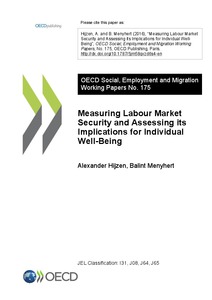Measuring labour market security and assessing its implications for individual well-being
"This paper provides a comprehensive discussion of the labour market security dimension of the OECD’s job quality framework, thereby complementing the analysis in Chapter 3 of the OECD Employment Outlook 2014 and Chapter 5 of the OECD Employment Outlook 2015. It makes three main contributions....
| Main Authors: | , |
|---|---|
| Institution: | ETUI-European Trade Union Institute |
| Format: | TEXT |
| Language: | English |
| Published: |
Paris
2016
OECD |
| Subjects: | |
| Online Access: | https://www.labourline.org/KENTIKA-19106619124919248919-Measuring-labour-market-securi.htm |
| Summary: | "This paper provides a comprehensive discussion of the labour market security dimension of the OECD’s job quality framework, thereby complementing the analysis in Chapter 3 of the OECD Employment Outlook 2014 and Chapter 5 of the OECD Employment Outlook 2015. It makes three main contributions. First, it provides an in-depth discussion of the definition and measurement of labour market security. and discusses in detail the various methodological issues surrounding its measurement. Second, it offers a comprehensive statistical portrait of labour market security across countries, socio-economic groups and over time. Third, it investigates the statistical relationship between labour market insecurity and subjective measures of well-being. Importantly, we find that the risk of unemployment has a detrimental effect on the well-being of employed workers, and that this reflects to an important extent the risk of staying unemployed for a prolonged period of time. Policymakers should therefore focus not only on reducing the level of unemployment, but also on speeding up unemployment turnover at a given level of unemployment. Unemployment insurance also mitigates the adverse effect of unemployment risk, and particularly that of long-term unemployment, on the well-being of the employed." |
|---|---|
| Physical Description: | 51 p. Digital |

